One of the country's smallest administrative areas has progressed in the past three decades, Huang Zhiling reports.
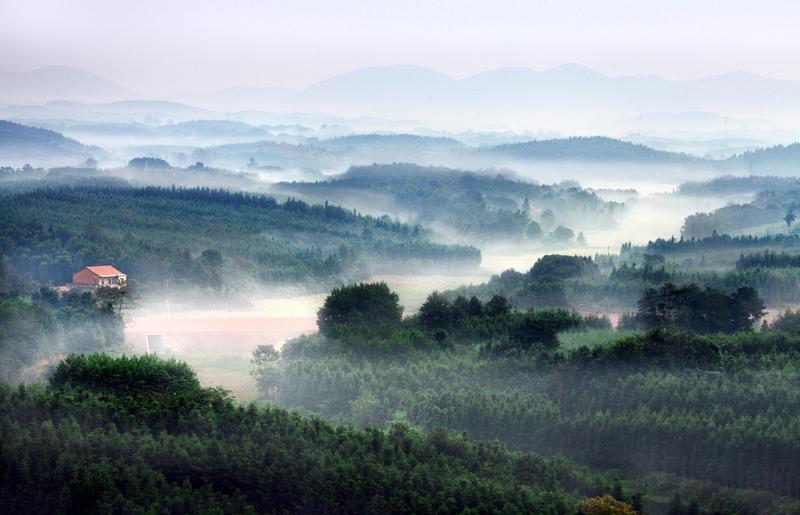 A bird's-eye view of the Tianye countryside park in Guanqiao town, Jiayu county, Hubei province. (PHOTO PROVIDED TO CHINA DAILY)
A bird's-eye view of the Tianye countryside park in Guanqiao town, Jiayu county, Hubei province. (PHOTO PROVIDED TO CHINA DAILY)
Tianye countryside park in Guanqiao town, Jiayu county, Hubei province, attracts numerous visitors on two-day trips over weekends and holidays.
Visitors like walking along the South and North Lakes in the hilly park — which only has a few tall buildings and a wide view — breathing fresh air and being immersed in tranquility away from the hustle and bustle of city life.
Many go up to the Wenchang Pagoda, which is nine stories tall and stands at a height of 59 meters. The pagoda, constructed in traditional fashion, was built at a cost of 100 million yuan ($14.5 million). It is a landmark of the park and takes only minutes to reach the top, thanks to an elevator inside. Looking down from the apex, visitors who have stayed long in big cities are overwhelmed by the green bamboo trees all around, and hills and lakes in the distance.
Wenchang deity, whose name literally means "cultural prosperity", is a legendary figure who helps students with learning. The name reflects villagers' respect for knowledge and education after bidding farewell to absolute poverty, says Liu Yuhong, a visitor to the site.
The 84-year-old pensioner in Jiayu knows the area's history well. In the early 1980s, villagers in Guanqiao lived in shabby sheds. They toiled year-round in the fields, but still had to worry about how to feed and clothe themselves.
Zhou Baosheng, 70-year-old local man, led the villagers to better incomes.
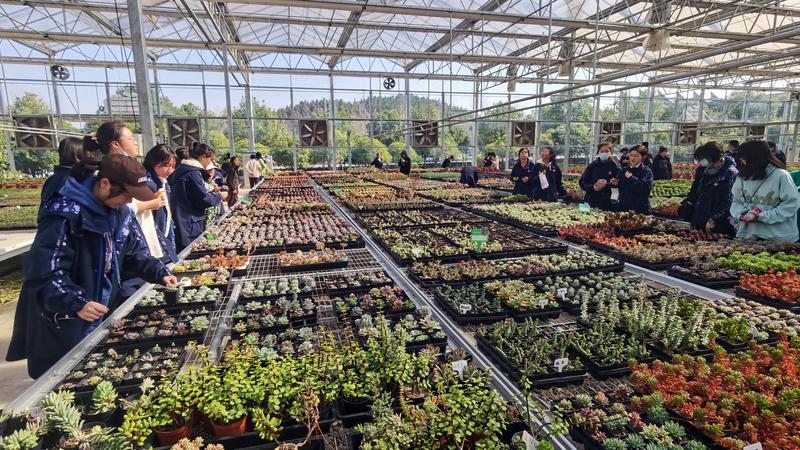 Students from a middle school attend a lesson in a greenhouse full of plants inside the Tianye countryside park. (PHOTO PROVIDED TO CHINA DAILY)
Students from a middle school attend a lesson in a greenhouse full of plants inside the Tianye countryside park. (PHOTO PROVIDED TO CHINA DAILY)
Villagers speak proudly of Zhou, who has been nominated six times as a deputy to the National People's Congress, China's legislature. When Zhou was selected as head of Guanqiao village's No 8 group in 1980, the group, as the smallest administrative unit in China is, nestled in the hills along the southern banks of the Yangtze River, was extremely poor. Sick villagers could not afford medicine and villagers had to barter for salt with eggs. The reason the area did not have a high grain yield was that one-third of the paddy fields were solely reliant on weather conditions. Zhou led villagers to dig ponds and irrigation ditches, and build motor generator stations. The next autumn, the group's grain yield rose by 3,500 kilograms, and for the first time, villagers did not have to worry about food.
At that time, China started its rural reform and farmers were no longer forbidden to dabble in industry and commerce. The No 8 group is near Guanqiao town, which had only one store back then.
Zhou organized some villagers to set up an agency, a shop selling prepared food and a popsicle factory in the town. In one year, they earned a net profit of 7,000 yuan, a considerable sum at that time. The group spent the money by setting up a coal mine and factories to make sofas, carpentry works and bricks and tiles. Back then it had 10 hills, rich with coal, and forestry reserves and soil suitable for making bricks.
Income from the mine and factories was further reinvested. The group opened shops, a forest farm, an orchard, a fish farm, saw mill, truck transportation center, tea plantation and a refined rice-processing factory.
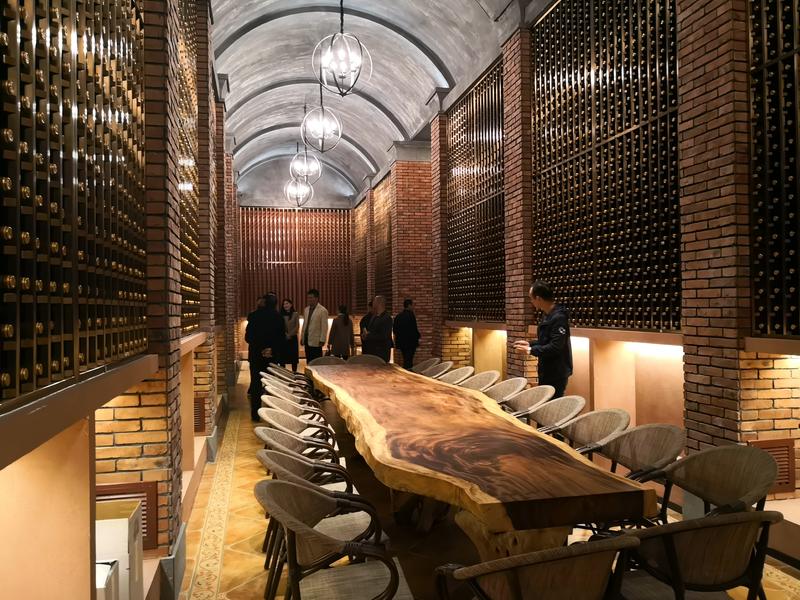 A cellar housing about 80,000 bottles of wine in the park. (PHOTO PROVIDED TO CHINA DAILY)
A cellar housing about 80,000 bottles of wine in the park. (PHOTO PROVIDED TO CHINA DAILY)
Within a few years, the group became known for doing well. Nearly every household moved into spacious two-story buildings with running tap water. The group was praised many times by governments at all levels as an example of how people in a rural area could become rich together.
But when the group entered the 1990s, Zhou realized that it could not hope for long-term prosperity if it did not upgrade its industries.
At that time, Liu Yesheng, a senior engineer in the State-owned Wuhan Metallurgical Research Institute in the provincial capital Hubei, was visiting the group. Impressed by its factory buildings and Zhou's enterprising spirit, Liu offered to help the village make better products. He quit his job at the institute and helped the group launch the Hubei Yangtze Alloy Factory. The factory's alloy serial products, used in petroleum-drilling equipment, passed appraisal in the United States. The factory's establishment marked the group's transition from a labor-intensive to a technology-heavy setup.
In 1994, the group started establishing a high-tech industrial park, attempting to woo big projects. To improve the environment, it adopted preferential policies for investors and spent more than 10 million yuan building 10,000 meters of standard factory buildings and employee housing.
More than 20 professors and experts from Wuhan worked full-time in the group's high-tech park. With their technological assistance, the group's high-tech enterprises made welding wires and cables. Thanks to the enterprises, villagers' incomes rose steadily. The annual average income of the 247 villagers in the group amounted to 95,000 yuan last year. The group's collective assets registered 6 billion yuan in 2022.
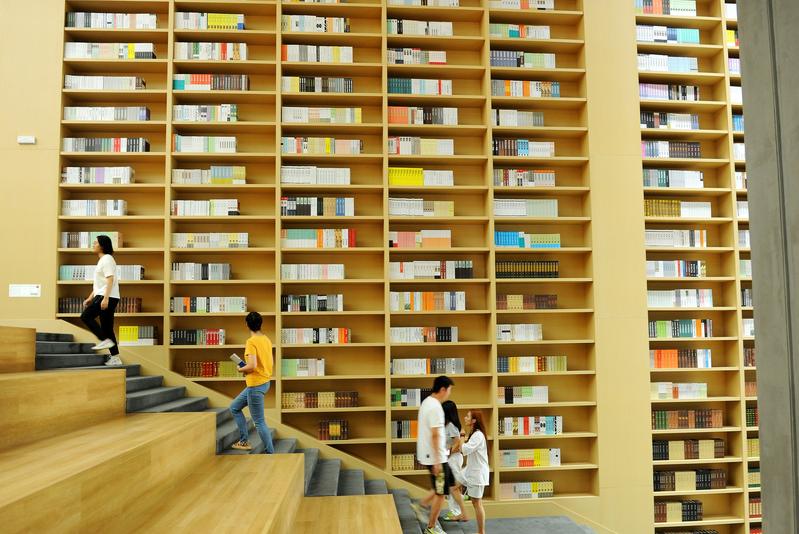 A library at Wuhan Donghu University located inside the park. (PHOTO PROVIDED TO CHINA DAILY)
A library at Wuhan Donghu University located inside the park. (PHOTO PROVIDED TO CHINA DAILY)
The group has invested hefty sums to improve its environment. For example, it has built Tianye countryside park, lakes with swans and Happy Farm, which is a demonstration area for modern agricultural techniques, showing how organic vegetables and fruits are grown, and organizing activities for visitors like picking vegetables and fruits.
In addition to growing vegetables and fruits, the farm has many agricultural science classes and a garden sporting activities suitable for children and their parents. Each March, some 100,000 tulips bloom quietly, decorating the entire farm in a sea of red, yellow, pink and purple flowers.
In December 2019, Tianye countryside park was rated as a national 4A tourist scenic spot by the Hubei Provincial Department of Culture and Tourism.
As Zhou realized the importance of education, the group started covering tuition fees for its primary and senior middle school students soon after it became better off. Each child born in the group is paid a monthly education and living allowance of 1,000 yuan from birth to high school graduation, and if the students are admitted to university and pledge to work in the group upon graduation, they will be given an annual education and living allowance of between 15,000 and 25,000 yuan each.
Co-operating with China University of Geosciences, the group has a postdoctoral program. In 2000, it set up a campus of Wuhan University at East Lake, an important institute of higher learning in the province, in cooperation with Wuhan University. With the approval of the Ministry of Education, the campus at East Lake changed its name to Wuhan Donghu University in 2011. More than 72,000 students have graduated from the university and 23,000 students are on its campuses in Wuhan and Jiayu.
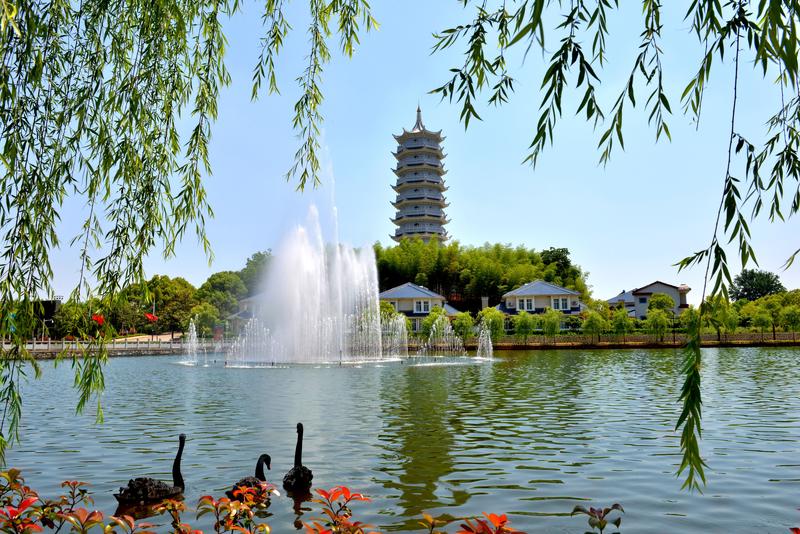 Swans swim on a lake facing the nine-story Wenchang Pagoda. (PHOTO PROVIDED TO CHINA DAILY)
Swans swim on a lake facing the nine-story Wenchang Pagoda. (PHOTO PROVIDED TO CHINA DAILY)
The Jiayu campus, which can accommodate 50,000 students, is in close proximity to Tianye countryside park. With an investment of 2.6 billion yuan, the campus' first-phase construction started in October 2020. It began enrolling students in the autumn of 2022, says Chu Xin, vice-president of the university.
Popular with senior middle school students on study trips from neighboring areas, the 108-hectare Jiayu campus has 10 schools, teaching subjects like rural vitalization and nursing.
Strolling through the No 8 group, which covers 3.8 square kilometers, visitors can find both traditional and modern elements, with Chinese teahouses and Western-style bars. They can also visit a cave wine cellar and buy a drink, says Zhou Xianmei, a server at the wine cellar.
The group has a well-furnished three-star hotel with 300 beds. Paying around 200 yuan for one night, visitors can enjoy the forest and a traditional Chinese pavilion if they leave their rooms for a walk.
The group is about 30 minutes by car from the Chibibei high-speed train station. which connects with Beijing and provincial capitals Wuhan, Changsha, Zhengzhou and Shijiazhuang.
Contact the writer at huangzhiling@chinadaily.com.cn


